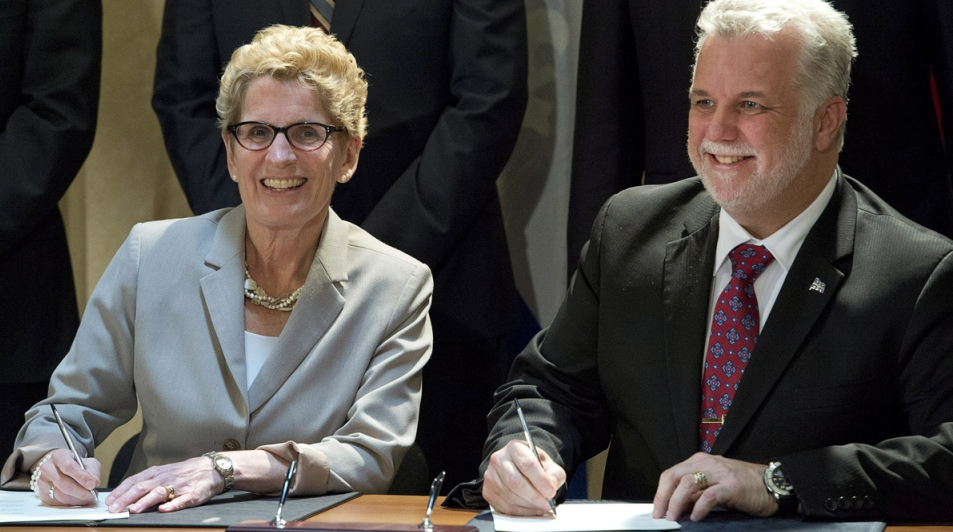Support strong Canadian climate journalism for 2025
Representatives from 22 provinces, states, and other regions across the Americas signed a climate action statement aimed at cutting greenhouse gas emissions and developing clean energy in Toronto today at the Climate Summit of the Americas.
The statement calls for greenhouse gas emission targets aimed at keeping temperature rises below two degrees Celsius and support for carbon pricing, including linked systems between regions, as well as demanding greater national-level action at Parties (COP) 21 talks in Paris this November.
"With strengthened collaboration across the Americas across provinces, states and cities we're providing critical climate change solutions," said Ontario Premier Kathleen Wynne.
In her home province, the statement will allow Ontario to build on past successes in tackling climate change, including its upcoming cap and trade program to curb major sources of greenhouse gas pollution, closure of all coal power plants, major investments in infrastructure that includes electrification of the rail network, and establishing a mid-term emissions reduction target by 2030, according to a government media release dated July 9.
Invoking the spirit of an earlier speech by former U.S. vice president Al Gore, Wynne pledged to co-operate with other provinces, including Alberta, who did not sign the statement.
"We know that climate change is already costing people of this province and around the world. That cost will only mount without our concerted efforts. With global emissions continuing to rise, we need national leadership now more than ever," said Wynne.
Notably absent from the signatories’ list was the Harper government, whose environment minister skipped the summit to attend Nunavut day in her constituency, a decision blasted by the NDP.
“I was dismayed to see that Canada’s Environment Minister, Leona Aglukkaq, refused to attend the Climate Summit of the Americas. Sadly, Minister Aglukkaq’s absence is not surprising given the Conservatives’ longstanding contempt for fighting climate change,” said Megan Leslie, the NDP’s environmental critic, in a media release dated July 9.
She further lambasted the Harper government for withdrawing from the Kyoto Protocol, weakening greenhouse gas emissions targets, and delaying oil and gas regulations, adding that “Stephen Harper’s approach to climate change is a complete failure and has left Canada with a tattered international reputation,”
“Canadians can trust Tom Mulcair’s NDP to fix the damage done by Stephen Harper’s Conservatives. Only New Democrats take the threat of climate change seriously. Canadians can trust an NDP government to protect the environment and grow the economy. Together we will build a fairer, greener and more prosperous Canada,” said Leslie.
But Wynne was more conciliatory towards Aglukkaq’s absence, saying that the “door was open,” to any federal involvement.
At the G7 Summit in Germany last month, Harper pledged to end all production and use of carbon-based energy by 2200, but his promise was condemned as inadequate by environmentalists and others.
But a lack of movement from national governments did not stop Ontario, Quebec, Vermont, Connecticut, California, BC, Baja California, Jalisco, Manitoba, Newfoundland and Labrador, Northwest Territories, Para in Brazil, Rio de Janeiro, Washington state, the cities of Burlington, Hamilton, Kitchener, and Vancouver, and in absentia Oregon, São Paulo, Yucatan, and the Town of Whitby, from signing the climate action statement in Toronto.
“The pan-American action statement that we signed today unites us and takes us a step closer to achieving a progressive agreement at COP-21 in Paris. Together, we are finding innovative ways to combat climate change while driving growth in a more sustainable, prosperous, and equitable low-carbon economy,” said Wynne.
The action statement builds on previous agreements such as California’s ‘Under 2’ Memorandum of Understanding that stresses direct action to keep a global temperature rise within 2 degrees Celsius, the Compacts of States and Regions, which commits partner jurisdictions to annual public reporting on greenhouse gas emissions.




Comments